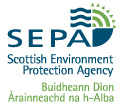Scottish Environment Protection Agency

Scottish Environment Protection Agency logo
|
|
| Abbreviation | SEPA |
|---|---|
| Formation | 1996 |
| Legal status | Executive non-departmental public body of the Scottish Government |
| Purpose | Environmental protection and regulation in Scotland |
| Location | |
|
Region served
|
Scotland |
|
Chief Executive
|
Terry A'Hearn |
| Website | www |
The Scottish Environment Protection Agency (SEPA; Scottish Gaelic: Buidheann Dìon Àrainneachd na h-Alba) is Scotland’s environmental regulator and flood warning authority. Its main role is to protect and improve Scotland's environment. SEPA does this by helping business and industry to understand their environmental responsibilities, enabling customers to comply with legislation and good practice and to realise the many economic benefits of good environmental practice. One of the ways SEPA does this is through the NetRegs environmental guidance service. It protects communities by regulating activities that can cause harmful pollution and by monitoring the quality of Scotland's air, land and water. The regulations it implements also cover the storage, transport and disposal of radioactive materials.
SEPA is an executive non-departmental public body (Executive NDPB, often known as a Quango) of the Scottish Government. SEPA was established in 1996 by the Environment Act 1995 and is responsible for the protection of the natural environment in Scotland. SEPA is a member of SEARS (Scotland's Environmental and Rural Services).
SEPA’s mission statement is to be an environmental regulator and an effective and influential authority on the environment.
SEPA provides a system of environmental protection for Scotland that aims to improve the environment and help deliver the Scottish Government’s overall environmental objectives.
So that it can effectively achieve its mission and aims, SEPA has created a Corporate Plan which lists its priorities and goals.
SEPA employs around 1,300 staff who are involved in protecting Scotland's environment and human health. SEPA’s staff are employed in a wide range of specialist areas which include: chemistry, ecology, environmental regulation, hydrology, engineering, quality control, planning, communications, business support and management functions.
...
Wikipedia
